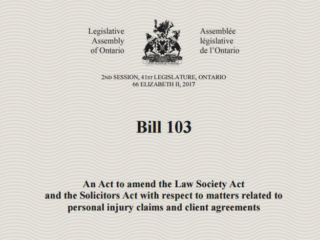CoA: If any clause within an employment contract offends the Employment Standards Act (ESA) – then the contract is void and non-severable.
The appellant employee brought an action for wrongful dismissal and moved for summary judgment seeking common law enhanced pay in lieu of notice. The core issue was the interpretation and application of the employment contract. In particular, a termination style clause which restricted pay in lieu of notice to ESA minimum entitlements.
The issue before the motion judge was whether the termination clause was unenforceable as it related to ‘termination with notice’. The employer conceded that the component part of the clause which dealt with ‘termination for cause’ was void as it attempted to contract out of the minimum ESA standards.
The position of the parties on the motion differed as to whether the ‘termination with notice’ clause is enforceable, on the basis that the ‘termination for cause’ clause is severable from the contract as a whole.
The Court of Appeal at [7] summarized the law of interpretation of employment clauses as stated by Laskin J.A. in Wood v. Fred Deeley Imports Ltd., 2017 ONCA 158 at [28]:
The ESA is remedial Legislation intended to protect the interests of employees. Courts should thus favour an interpretation of the ESA that “encourages employers to comply with the minimum requirements of the Act” and “extends its protections to as many employees as possible”, over an interpretation that does not do so: Machtinger, p. 1003. . .
Termination clauses should be interpreted in a way that encourages employers to draft agreements that comply with the ESA. If the only consequence employers suffer for drafting a termination clause that fails to comply with the ESA is an order that they comply, then they will have little or no incentive to draft a lawful termination clause at the beginning of the employment relationship: Machtinger, p. 1004. . .
The Court of Appeal went on to reiterate at [10] that an employment agreement must be interpreted as a whole and not on a piecemeal basis. The correct approach is to determine whether the termination provisions in an employment agreement read as a whole, violate the ESA. The respondent argued that the clause ought to be severable so as to save the agreement. The Court declined to apply the express severability style clause from the agreement, citing North v. Metaswitch Networks Corporation, 2017 ONCA 790 on the basis that a severability clause cannot have an effect on clauses of a contract made void by statute.
In allowing the Appeal, the court imparted the following principle at [10]:
Recognizing the power imbalance between employees and employers, as well as the remedial protections offered by the ESA, courts should focus on whether the employer has, in restricting an employee’s common law rights on termination, violated the employee’s ESA rights. While courts will permit an employer to enforce a rights-restricting contract, they will not enforce termination provisions that are in whole or in part illegal. In conducting this analysis, it is irrelevant whether the termination provisions are found in one place in the agreement or separated, or whether the provisions are by their terms otherwise linked.













